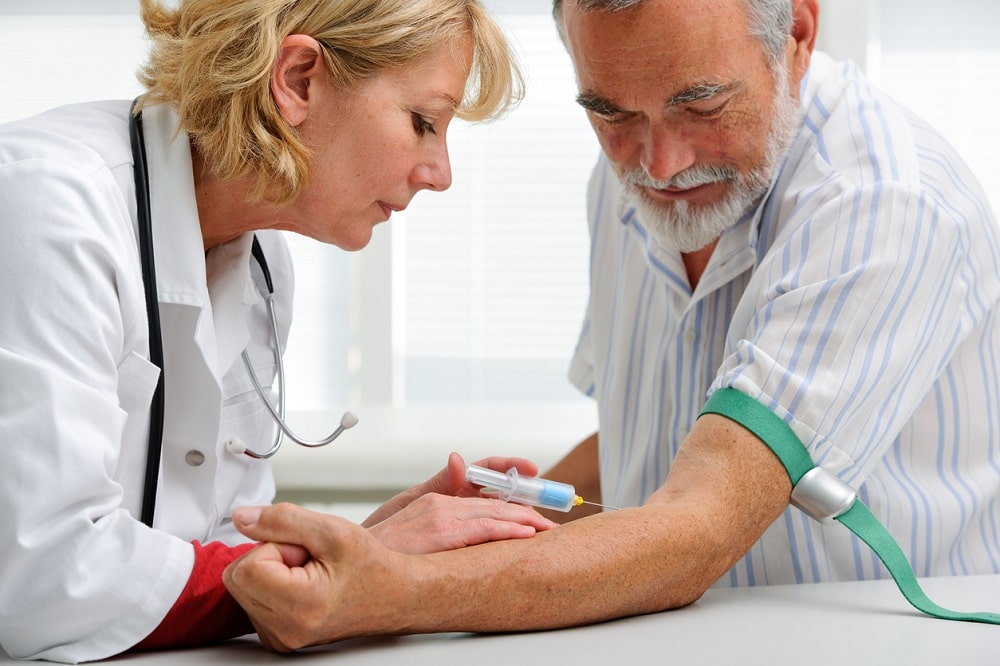Table of Contents
- What Is Erectile Dysfunction?
- Causes of Erectile Dysfunction
- Age of ED: What To Expect and When
- What Are the Symptoms of ED?
- How to Diagnose Erectile Dysfunction
- How to Prevent ED
- Hormonal Causes of Erectile Dysfunction
- How Different Hormonal Imbalances Can Affect Men’s Sexual Function
- Options for Erectile Dysfunction Treatment
- How Can We Help?
Erectile dysfunction (ED) is a problem that affects many males as they age and can occur for many different reasons. In this review, we examine the definition of erectile dysfunction, its causes, symptoms, diagnosing ED, hormonal influences on erections, and treatments available.
Before getting concerned about ED, know that it is normal for any man to experience an occasional problem in the bedroom. Everyday stresses, work-related concerns, even fatigue and lack of sleep can interfere with achieving a hard, long-lasting erection. There is no need for medical help if, more often than not, a proper and satisfying erection is achieved.
However, frequent erectile dysfunction can be a sign of more significant problems that require attention. Many health issues can influence the attainment of an erection, and those could be detrimental to one’s well-being. Difficulties in a relationship are also concerns that need addressing as they can influence other areas of a person’s life.
Whether the problems are physical or psychological in nature, it is essential to seek diagnosis and treatment of erectile dysfunction.
Many males experience some form of erectile dysfunction during their lives, yet it is only a concern when the ED becomes frequent in nature. ED is the result of interference at any point in the erection process.
What Is Erectile Dysfunction?
The definition of erectile dysfunction is an inability to achieve or sustain an erection that is firm enough for satisfactory sex.
Numerous actions influence the ability to achieve an erection, including:
- Brain signals that stimulate erectile responses
- Release of nitric oxide (NO) from nerve endings in the corpora cavernosa endothelial cells
- Activation of guanyl cyclase which generates cyclic guanosine monophosphate (cGMP) to induce relaxation in smooth muscles in the penis
- Increased blood flow into the corpora cavernosa spaces resulting in the engorgement of the penis
The above steps are part of a complicated process that results in a healthy erection. Interference in any part of these actions can result in erectile dysfunction. If the spongy muscle tissue of the corpora cavernosa cannot trap the blood flow, the blood leaves the veins, reentering the circulation, and the erection declines.
Causes of Erectile Dysfunction
It is not always easy to pinpoint the exact cause of a man’s erectile dysfunction. Sometimes, it takes speaking with both medical and psychological professionals to determine what causes erectile dysfunction before treatment is possible. There is also the need for a man to be completely honest about his actions, lifestyle habits, relationships, and health to get to the bottom of the problem.
In the list below, we examine the many possible causes of erectile dysfunction:
Physical erectile dysfunction causes:
- Arterial or Cardiovascular Disease – clogged blood vessels, problems with circulation, or heart disease can interfere with the ability to send enough of a blood supply to the penis. High blood pressure and cholesterol levels can contribute to these issues.
- Cancer – treatment (surgery or radiation) to the pelvis or lower abdomen can cause erectile problems.
- Chronic Kidney Disease – as many as 80% of men with CKD also suffer from ED. Hormonal changes, as well as endothelial dysfunction, often link CKD to erectile dysfunction.
- Diabetes – can result in damage to the nerves or small blood vessels in the penis, which can interfere with proper signals and blood engorgement.
- Hormonal Imbalances – we will focus on these factors further down in this report.
- Injuries – any injury that interferes with the signals coming from the brain to the penis, as well as those to the pelvic area (including the testes and penis), can impact the ability to achieve an erection.
- Metabolic Syndrome – a condition that consists of numerous factors, including abdominal fat (obesity), high cholesterol and insulin levels, and elevated blood pressure.
- Multiple Sclerosis – because MS damages nerves that run along the spinal cord, the sexual signals from the brain do not always reach the sexual organs.
- Obesity – being obese can cause damage to the blood vessels, decrease testosterone, and increase the risk of many other conditions that also contribute to ED.
- Parkinson’s disease – men with Parkinson’s may find that the condition affects the autonomic nervous system, also resulting in death to dopamine-producing nerve cells that transmit the necessary signals that regulate smooth muscle activities. Reduced dopamine also lowers sex drive. Blood circulation problems are also present that can inhibit erections.
- Peyronie’s disease – this condition can cause scar tissue formation (plaque) and bending in the penis that can interfere with erections.
- Prescription Medications – certain drugs can interfere with erectile functions, including some that treat depression, cancer, pain, prostate conditions, and high blood pressure. Over-the-counter medications such as Zantac and Tagamet can also interfere with testosterone functions and decrease sexual interest.
Psychological or emotional erectile dysfunction causes:
- Anxiety, depression, or other mental health issues – accounting for up to 20% of ED, performance anxiety, depression, low self-esteem, and other psychological factors can lead to problems in the bedroom
- Relationship problems – poor communication between partners, growing apart, and even infidelity can result in erectile dysfunction.
- Stress – job, money, family, or relationship problems can increase stress and interfere with erectile functions.
Lifestyle, age-related, or controllable erectile dysfunction causes:
- Aging – we cannot control aging; however, it can interfere with achieving a healthy erection as the risk of hormonal decline and other health issues increases.
- Alcohol or substance abuse – depending on the type, recreational drugs, and alcohol can narrow blood vessels, decrease sexual desire, inhibit smooth muscle relaxation, reduce testosterone levels, and damage the cells in the testes that manufacture testosterone.
- Sleep disorders – sleep apnea, one of the most common sleep disorders, can lower testosterone levels, and increase the risk of ED.
- Tobacco use – smoking (nicotine) can decrease sexual desire.
Age of ED: What To Expect and When
Erectile dysfunction can occur at any age, especially when taking into consideration the many causes previously discussed. A man who experiences testicular cancer in his twenties or thirties is at a greater risk of developing erection issues at that time.
Below, we look at the most common causes of ED based on age:
- 20’s – early 30’s: In most cases, early-onset of ED is due to either significant medical, psychological, or substance abuse issues. Smoking, drug, or alcohol abuse are the leading causes of erectile dysfunction in younger men.
- 30’s – 40’s: Peyronie’s disease, poor lifestyle habits, stress, medication side-effects, relationship issues, depression, heart disease, and diabetes are the most common causes of ED in this age group.
- 50’s – 60’s: Physical factors are the most common causes of ED in middle-aged males. Long-term substance abuse, as well as the conditions previously mentioned above, can contribute to erectile dysfunction at this age.
- 70’s – 80’s: Aging males are more likely to suffer from conditions such as cardiovascular disease, hypertension, diabetes, atherosclerosis, and hormone deficiency – all which can contribute significantly to ED.
What Are the Symptoms of ED?
We are often asked how to know if you have erectile dysfunction. The warning signs of erectile dysfunction are along the lines of what one might expect:
- Cessation of morning erections
- Trouble reaching or sustaining an erection
- Reduced or lack of sexual desire
- Premature or delayed ejaculation
- Inability to achieve an orgasm
How to Diagnose Erectile Dysfunction
The diagnosis of erectile dysfunction is a bit more involved than with other medical conditions. If a man does not suspect any health issues, and age-related hormonal decline is possible, contacting a hormone clinic or endocrinologist may speed a diagnosis.
Unless there is a significant identifiable cause of ED from the list above, a man may want to contact a urologist for a thorough medical examination. If any of the prior physical conditions are present, a discussion with one’s family practitioner, cardiologist, or any other treating doctor is advisable. Certain medications could be the cause, and the provider may be able to make changes to improve erectile functions.
During the diagnostic phase, the doctor will take a complete medical and sexual history. Please be prepared to discuss what you experience when attempting to achieve an erection. It is also necessary to be completely open and honest about any substance use. That is the only way to get a proper diagnosis and treatment plan. The doctor will also conduct a complete physical examination of the body and the penis and testes for any problems. Changes in male breast size or hair growth could also point to hormonal issues as being involved.
The doctor may run diagnostic lab tests to check for hormonal imbalance, diabetes, kidney disease, and other concerns that can cause ED. Imaging tests such as ultrasound can determine if poor blood flow through the penis is a problem. A nocturnal penile tumescence (NPT) test consists of wearing a portable, battery-powered device on the thigh to measure nocturnal erections. Finally, the doctor may utilize an injection test that sends medication into the penis to stimulate an erection to evaluate firmness and lasting time.
In the absence of physical causes or substance abuse, it may then be necessary to meet with a mental health professional to discuss possible issues influencing erectile functions. Job, family, and relationship problems can also contribute to erectile dysfunction. Addressing these issues and learning coping techniques are often beneficial in these circumstances.
Typical question topics during diagnosis include:
- Prior medical issues and treatments
- Prescription and over-the-counter medications and supplements used
- Recreational drug and alcohol use
- Tobacco usage
- Urinary issues
- Injuries, past and present
- Symptom details, including when they began, frequency, duration
- Changes in erections, orgasms, and ejaculation
- Urinary or ejection pain or changes in sensation
- Stress, depression, or other mood changes
- Relationship status and issues
How to Prevent ED
The prevention of erectile dysfunction begins with leading a healthy lifestyle and managing any medical conditions.
Here are some steps to take, starting at an early age (one’s twenties) to reduce the risk of ED:
- Get plenty of rest (seven to nine hours of sleep each night)
- Exercise regularly
- Keep weight in check
- Avoid smoking and substance abuse
- Decrease alcohol use to moderate levels
- Get yearly health checkups
- Reduce stress and anxiety
- Seek help for depression or other mental issues
- Keep any medical conditions under control
- Maintain a healthy diet, increasing the consumption of fruits, vegetables, whole grains, and lean protein while decreasing the intake of processed sugars, sodium, full-fat dairy, and red meats
Another possible benefit for men is similar to one done by women – Kegel exercises – to strengthen the pelvic floor muscles. To identify the muscles, stop peeing in midstream. The muscles used to halt the urinary flow are the ones you need to tighten. To perform the Kegel exercise, contract these muscles and hold them for three seconds and release for a total of 10 to 20 times in one set. Repeat this process up to three times a day. Kegel exercises can be done while sitting, standing, or lying down.
Hormonal Causes of Erectile Dysfunction
Hormonal imbalance is sometimes a cause or contributing factor in erectile dysfunction. Erections require the release of nitric oxide from the non-adrenergic noncholinergic (NANC) nerve fibers and acetylcholine from the parasympathetic cholinergic nerve fibers. That leads to increased cGMP concentrations and smooth muscle cell relaxation. Without enough of the necessary hormones that promote these activities, achieving an erection becomes increasingly difficult.
Why do hormones affect erectile functions?
The hormones are the body’s chemical messengers, stimulating the many actions that occur every day. Without enough hormones, their receptors remain dormant, unable to carry out their functions. If any of the hormones that influence erections decline, the penis will have a difficult time becoming engorged with blood to sustain sexual performance. The male sexual cycle relies on the complex association between the neuroendocrine, genital, and vascular systems. Any issue along the pathway can lead to problems. Hormonal decline associated with aging is a common occurrence that can interfere with numerous aspects of erectile performance.
Which hormones can cause erectile dysfunction?
In the next section, we look at each hormone that contributes to healthy erectile functions.
How Different Hormonal Imbalances Can Affect Men’s Sexual Function
Although testosterone may be the first hormone to come to mind when discussing male sexual function, it is not the only one that can influence erectile dysfunction. In this section, we take a close-up look at the various hormones that can affect ED.
Testosterone
The primary male sex hormone, testosterone, plays a leading role in erectile functions. Testosterone acts on the androgen receptors in the brain that can help stimulate erotic and sexual thoughts and fantasies. Because it also helps reduce the levels of the stress hormone cortisol, testosterone also improves sleep, and feeling rested can benefit sexual thoughts and functions.
Another benefit of testosterone for erectile functioning is its stimulation of red blood cell production. One of the signs of low testosterone is anemia. When a man does not produce enough red blood cells, his circulation will suffer. With poor circulation comes a decrease in the blood supply to the penis. Low testosterone is also linked to high levels of LDL and total cholesterol and triglycerides, implicated in atherosclerosis and blocked arteries which inhibit blood flow.
While not always linked to ED, low testosterone is a contributing factor for many males. Testosterone replacement therapy (TRT) for men with Low T often helps improve erectile functions and sex drive. TRT also helps
Sex Hormones:
Luteinizing Hormone
Men with higher luteinizing hormone (LH) levels and low testosterone have been shown in studies to have an increased ED risk.
Follicle-Stimulating Hormone
Men with high or low follicle-stimulating hormone (FSH) levels associated with low testosterone have a higher risk of erectile dysfunction.
Prolactin
Hyperprolactinemia (prolactin increase) decreases gonadotropin-releasing hormone (GnRH) secretion, resulting in reduced testosterone production. Elevated prolactin levels also inhibit central dopamine action. Patients with hyperprolactinemia often have significantly lower LH, FSH, and testosterone levels. Too much prolactin may be due to a tumor in the pituitary gland.
Thyroid Hormone
Elevated levels of thyroid-stimulating hormone (TSH) is associated with endothelial dysfunction, reducing NO formation and availability. Thyroid hormone receptors are expressed in smooth muscle and corporal cavernosa endothelial cells. ED is more common in men with hyperthyroidism and hypothyroidism, showing the need for balanced hormone levels for optimum erectile functions.
Human Growth Hormone
Changes in the production of growth hormone (GH) could lead to erectile dysfunction for some males. One of the critical functions of GH is the stimulation of insulin growth factor 1 (IGF-1) secretion by the liver. IGF-1 promotes the formation of endothelial nitric oxide, crucial for healthy erections.
Like testosterone, GH levels decline with age, beginning in a man’s mid to late-twenties. GH also works on growth hormone receptors in the brain that influence neurotransmitter functions. Testosterone and growth hormone also stimulate each other’s production, which can increase the risk of ED as their levels decline. As with testosterone, GH also influences LDL and total cholesterol levels and metabolism, increasing the risk of obesity, metabolic syndrome, type 2 diabetes, and cardiovascular diseases.
Growth hormone also helps lower cortisol levels while it improves sleep. Human growth hormone (HGH) therapy can help increase GH levels in the bloodstream. Men who receive HGH therapy often report improved erectile functions and increased sex drive.
Options for Erectile Dysfunction Treatment
In addition to the various types of hormone therapy mentioned previously, there are other treatments available for erectile dysfunction, including:
- Phosphodiesterase type-5 inhibitors such as Cialis, Viagra, Stendra, and Levitra to increase blood flow to the penis (do not take if using nitrates for the heart)
- Penile injections – can be done at home into the side of the penis
- Vacuum erection devices – a plastic tube used over the penis with a pump that creates a low-pressure vacuum and an elastic ring placed around the base of the penis to sustain an erection for up to 30 minutes
- Intraurethral medication such as Alprostadil (also used for injections)
Some men who still have no luck after trying other options may require surgical intervention:
- Penile implants:
- Inflatable implant uses a pump to enlarge the penis
- Malleable implant allows for manual penis adjustment
- Vascular surgery:
Repairs blocked arteries to improve blood flow
While there is no magic answer to the question of how to cure erectile dysfunction naturally, there are steps that every man can take right now:
- First, refer back to the section above on preventing erectile dysfunction
- Consider supplements and herbs such as zinc, vitamin D, ginseng, DHEA, L-arginine, L-carnitine, and horny goat weed – do not take supplements without discussing with your doctor
- Acupuncture may help treat ED due to psychological causes through neurotransmitter release
- Prostatic massage may help promote blood flow to the penis and requires the expertise of a specially trained professional
How Can We Help?
At our hormone clinic, we treat men who suffer from a wide range of symptoms associated with hormonal imbalance. Erectile dysfunction is one such condition that we find frequently linked to hormonal decline.
Diagnosing hormonal-based ED begins with a consultation to discuss any symptoms and health-related issues. We will also examine potential lifestyle habits and extenuating factors that could lead to erectile problems and hormone changes.
Following our free, confidential consultation by phone, we move to the next phase of diagnosis – blood analysis and physical examination. Not only do these two steps provide the needed answers about hormone and other blood levels, but they also help rule out any other underlying issues that could be at the root of a man’s erectile dysfunction.
Upon diagnosing a hormonal imbalance, the next step is the determination of a personalized treatment plan.
For most men, that treatment falls under one of the following categories:
While testosterone replacement is not a cure for ED, it is often the answer needed by many males. Due to its ability to improve red blood cell production, circulation, and neurotransmitter functions and dopamine release, TRT often promotes better erectile performance.
Increasing GH levels with human growth hormone therapy helps improve IGF-1 stimulation of NO for better, stronger erections. HGH not only helps increase testosterone levels while lowering cortisol levels for better sleep, but it also works directly on the brain to help stimulate sexual desire and arousal.
If we determine other hormone levels to be at the cause of any erectile dysfunction, we will address those issues, as needed.
Our hormone clinic is here to help you determine if balancing your hormone levels can help improve sexual desire and erectile functions. Contact us today for a free consultation by phone for more information.








No Comments
Sorry, the comment form is closed at this time.